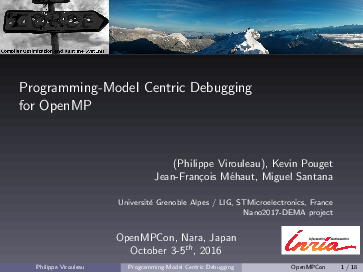BOAST: A metaprogramming framework to produce portable and efficient computing kernels for HPC applications
Aug 04, 2017 in PaperThe journal article I co-authored with B. Videau within the Mont-Blanc project is now published in The International Journal of High Performance Computing Applications.
The part I wrote are related to the porting of
Specfem3D to OpenCL,
and testing non-regression using
debugging traces.
- 5.3 Porting SPECFEM3D application kernels: From CUDA to OpenCL using BOAST
- 4.3 Non-regression testing using trace debugging
The portability of real high-performance computing (HPC) applications on new platforms is an open and very delicate problem. Especially, the performance portability of the underlying computing kernels is problematic as they need to be tuned for each and every platform the application encounters. This article presents BOAST, a metaprogramming framework dedicated to computing kernels. BOAST allows the description of a kernel and its possible optimizations using a domain-specific language. BOAST runtime will then compare the different versions’performance as well as verify their exactness. BOAST is applied to three use cases: a Laplace kernel in OpenCL and two HPC applications BigDFT (electronic density computation) and SPECFEM3D (seismic and wave propagation).








